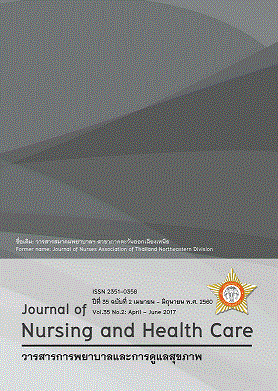ปัจจัยทำนายพฤติกรรมส่งเสริมพัฒนาการเด็กปฐมวัยของผู้ปกครอง ในจังหวัดพะเยา Predictive factors of parental behaviors on promoting early childhood development in Phayao province
คำสำคัญ:
ปัจจัยทำนาย การส่งเสริมพัฒนาการเด็ก ผู้ปกครอง Predicting factors, Promoting child development, Parentsบทคัดย่อ
บทคัดย่อ
การวิจัยนี้มีวัตถุประสงค์เพื่อศึกษาพฤติกรรมและปัจจัยทำนายพฤติกรรมการส่งเสริมพัฒนาการเด็กปฐมวัยของผู้ปกครองในจังหวัดพะเยา คัดเลือกกลุ่มตัวอย่างโดยวิธีสุ่มอย่างง่ายแบบแบ่งชั้นตามสัดส่วนแต่ละอำเภอ กลุ่มตัวอย่างเป็นผู้ปกครองเด็กอายุ 2 - 5 ปี จำนวน 365 ราย เครื่องมือวิจัยมี 6 ชุด ได้แก่ 1) แบบสอบถามข้อมูลส่วนบุคคล 2) แบบประเมินพฤติกรรมการส่งเสริมพัฒนาการเด็ก 3) แบบประเมินการรับรู้ประโยชน์ในการส่งเสริมพัฒนาการเด็ก 4) แบบประเมินการรับรู้อุปสรรคในการส่งเสริมพัฒนาการเด็ก 5) แบบประเมินการรับรู้สมรรถนะแห่งตน และ 6) แบบประเมินการสนับสนุนทางสังคมจากศูนย์พัฒนาเด็กเล็ก วิเคราะห์ข้อมูลโดยการวิเคราะห์ความถดถอยพหุคูณแบบปกติ ผลการศึกษาพบว่า กลุ่มตัวอย่างมีพฤติกรรมการส่งเสริมพัฒนาการเด็กอยู่ในระดับ ปานกลาง (mean=2.84, SD=0.41) ปัจจัยที่ร่วมกันทำนายพฤติกรรมส่งเสริมพัฒนาการเด็กปฐมวัยของผู้ปกครอง คือ การรับรู้สมรรถนะแห่งตนในการส่งเสริมพัฒนาการเด็ก (β= .377, p<.001) และการสนับสนุนทางสังคม (β= .196, p<.05)
Abstract
This research aimed to explore parental behaviors and examine the predicting factors of their child development promoting behaviors in Phayao Province. Data were gathered from 365 parents who had 2-5 years old child and were selected by the multistage random sampling. The six instruments used for data collection consisted of 1) personal information questionnaire, 2) child development promoting behavior questionnaire, 3) perceived benefits of promoting child development questionnaire, 4) perceived barriers to promoting child development questionnaire, 5) perceived self-efficacy questionnaire, and 6) social support on promoting child development questionnaire. The data were analyzed using descriptive statistics and all enter multiple regression analysis. Results showed that the sample had a moderate level of child development promoting behaviors (mean=2.84, SD=0.41). Predictors of child development promoting behaviors were perceived self-efficacy (β= .377, p<.001) and social support (β= .196, p<.05).



